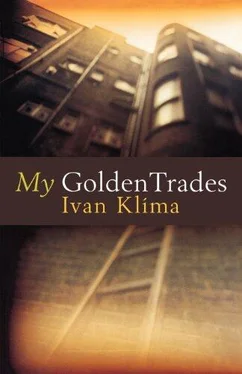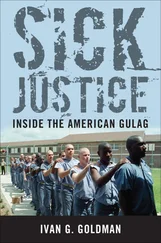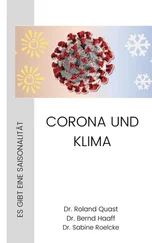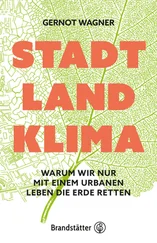Ivan Klima - My Golden Trades
Здесь есть возможность читать онлайн «Ivan Klima - My Golden Trades» весь текст электронной книги совершенно бесплатно (целиком полную версию без сокращений). В некоторых случаях можно слушать аудио, скачать через торрент в формате fb2 и присутствует краткое содержание. Год выпуска: 1998, Издательство: Granta UK, Жанр: Современная проза, на английском языке. Описание произведения, (предисловие) а так же отзывы посетителей доступны на портале библиотеки ЛибКат.
- Название:My Golden Trades
- Автор:
- Издательство:Granta UK
- Жанр:
- Год:1998
- ISBN:нет данных
- Рейтинг книги:4 / 5. Голосов: 1
-
Избранное:Добавить в избранное
- Отзывы:
-
Ваша оценка:
- 80
- 1
- 2
- 3
- 4
- 5
My Golden Trades: краткое содержание, описание и аннотация
Предлагаем к чтению аннотацию, описание, краткое содержание или предисловие (зависит от того, что написал сам автор книги «My Golden Trades»). Если вы не нашли необходимую информацию о книге — напишите в комментариях, мы постараемся отыскать её.
My Golden Trades — читать онлайн бесплатно полную книгу (весь текст) целиком
Ниже представлен текст книги, разбитый по страницам. Система сохранения места последней прочитанной страницы, позволяет с удобством читать онлайн бесплатно книгу «My Golden Trades», без необходимости каждый раз заново искать на чём Вы остановились. Поставьте закладку, и сможете в любой момент перейти на страницу, на которой закончили чтение.
Интервал:
Закладка:
I finally got my slice of Okay Pizza and left the gloomy passageway. A circular bench was occupied by tourists also eating pizza. A dark-haired woman, perhaps Italian or Spanish, was sitting on the lap of her Italian or Spanish boyfriend, feeding him. She had a very short skirt, short legs, and a firm left breast. Her boyfriend's hand covered the right one. I have never been to Italy or Spain, though I have always felt drawn to those countries, not so much by their famous historical attractions as by my theory that the people there are of a passionate nature, with whole, integrated characters and thus with interesting stories to tell. But perhaps I'm wrong; this beautiful young woman probably worked in a department store, and her story wouldn't be much different than the stories of our Czech girls who work in Kotva or Máj here in Prague. She noticed that I was observing her and stuck her tongue out at me. I looked away, above her. For the first time in my life I noticed an enormous clock which, not surprisingly, displayed some unreal time.
I started up Wenceslas Square towards the subway station. I don't find walking through the city distracting. In no time I'm alone, composing a story, a speech or a letter in my head. I don't enjoy writing letters, but sometimes I
like to imagine writing to women I have loved, or even to authors who've drawn me to them with a sentence, an image or an idea. I also write imaginary letters to important personages — but such letters tend to be brief, and questioning rather than reproachful. I actually wrote some of the love letters, but so far, not a single one of the other kind.
In the subway train there was a group of young girls, probably students, or apprentices from one of the department stores. They were not wearing uniforms, yet they all seemed alike, as though they were all from the hand of a single uninspired and untalented artist. I took one of the newsletters out of my bag and opened it:
INTERNAL DIRECTIVES AND INSTITUTIONAL PRINCIPLES FOR THE USE OF THE F.C.S.N. FOR THE PURPOSES ESTABLISHED BY THE DECLARATION OF THE F.M.F., M.F., CSR, SSR, AND THE U.R.O. # 21/1986 SB., ON THE F.S.CP.
Deciphering the headlines immediately absorbed all my attention, and while I read the details about the Fund for Cultural and Social Needs, the train rushed through the dark tunnel, carrying me to my next destination.
It was a six and a half minute walk from the subway station to the institute. The horizon on all sides was punctuated by blocks of grey, mostly unfinished pre-fab high-rise apartments with enormous broad-shouldered cranes towering above them; inspiration for poets who did not have to live there. But the walk itself was pleasant. There was a meadow on one side, and the pavement was separated from the road on the other side by a thick hedge of wild rose. With a little imagination, you could pretend you were walking down to the beach on the Baltic coast.
A fat guitarist was sitting in the porter's office. Students from the conservatory took turns working shifts on the door: the guitarist, a violinist and a clarinet player. All of them had the same peculiarity: they took no notice whatever of what went on outside the porter's booth. The guitarist had a girlfriend with him, and she was sitting on the table with her back to the new arrivals, symbolically emphasizing the wall between the world of the conservatory students and that of the computer programmers. Unobserved, I walked past the porter's lodge, then down several corridors before I came to the door to the main hall of the institute.
The building was new, clean, and full of light. What I liked most about it was a small atrium where, thanks to the efforts of the female programmers, dragon trees, dieffenbachia, plectranthus and even a tiny palm tree I was unable to classify flourished.
There was no one in the hall except a little girl sitting at a table drinking milk from a carton. I thought she must be Engineer Vandas' daughter, and I asked her where her father was.
She shrugged her shoulders and handed me a piece of coloured paper. 'Look what I drawed.'
The picture showed a bed, and on the bed was a figure sliced in two, with flowers laid on her breast.
'Who's that?' I asked.
'It's Mama, of course,' she said.
There was a fresh item on the notice board, a clipping from Lidová demokracie.
MYSTERY UNRAVELLED
Suva: After a sixty-five-year investigation, the Fiji police recently detained an eighty-two-year-old confidence man, R. Tama, who, according to police spokesmen,
had 'dishonoured a hundred and thirty-two women and girls.' The police had long known about the octogenarian Romeo but lacked evidence. They later discovered that all of the women had subsequently perished in a coconut grove not far from Tama's place of residence. Another remarkable circumstance, however, was the fact that all of them had died when a coconut had fallen on their heads. The mystery was solved when Constable Ratilau discovered a personal computer and a large number of programmes under a mattress stuffed with palm leaves in Tama's air-conditioned apartment. Tama had used the computer to calculate when a coconut from a particular tree would fall. Then he would send his 'wives' to lie under the tree. Sources close to the investigation said that an unnamed Japanese electronics firm had, not without profit, helped to produce Tama's computer programmes.
Mr Bauer was just walking past and, noticing my look of disbelief, explained that Mr Vandas had send this report to the papers as part of a bet he'd made with someone that people would believe almost any nonsense about computers. He wrote this story, sent it off — and won.
Computer programmers love practical jokes. Once Mr Klíma added some built-in commands to the master programme used by Mrs Rybová. Suddenly, her terminal emitted a bubbling sound and a message flashed on the screen: Water is entering your computer/ Shut off mains water at once! Rybová ran out of her office, yelling for someone to turn off the water. In addition to playing jokes on each other, the programmers play tennis, go on long
weekend hikes, and occasionally get together, drink wine and tell stories, all so they won't go crazy from constant conversation with their computers.
I walked through the offices, but they were all empty. I put the catalogue on Miss Kosinová's desk; the gaudy cover looked out of place among the test reports and specialist magazines. Miss Kosinová was a group leader at this site, and I wasn't surprised that the catalogue was for someone else; she was always finding things for someone else. I couldn't imagine her wasting her time leafing through a catalogue. She had never married, they said, because a family would interfere with her work. But the real reason, it seemed to me, was her kindness. She was so kind, so concerned for others, that she could not serve two masters; the feeling that she was neglecting one of them would have been unbearable.
The next hall contained only a small desk-top computer, and it was there that I found them all, including Miss Kosinová and the only member of the Communist Party in the institute, Mrs Rybová. In the middle of the room, seated at the computer, was Mr Vandas with his younger daughter on his knee. His good-natured, bearded face showed tension or more likely pain. The coloured monitor displayed a two-lane highway with cars flashing by in opposite directions. Mr Vandas directed his car with subtle movements of his joystick, passing on the left, rejoining the flow while adroitly avoiding the cars that were hurtling towards him. Brightly lit cities, petrol pumps, bridges and side-roads flashed by, and silhouetted on the horizon were high mountains, perhaps the Rockies themselves, where the driver was heading.
The others in the room were so intent on the game that
Читать дальшеИнтервал:
Закладка:
Похожие книги на «My Golden Trades»
Представляем Вашему вниманию похожие книги на «My Golden Trades» списком для выбора. Мы отобрали схожую по названию и смыслу литературу в надежде предоставить читателям больше вариантов отыскать новые, интересные, ещё непрочитанные произведения.
Обсуждение, отзывы о книге «My Golden Trades» и просто собственные мнения читателей. Оставьте ваши комментарии, напишите, что Вы думаете о произведении, его смысле или главных героях. Укажите что конкретно понравилось, а что нет, и почему Вы так считаете.












